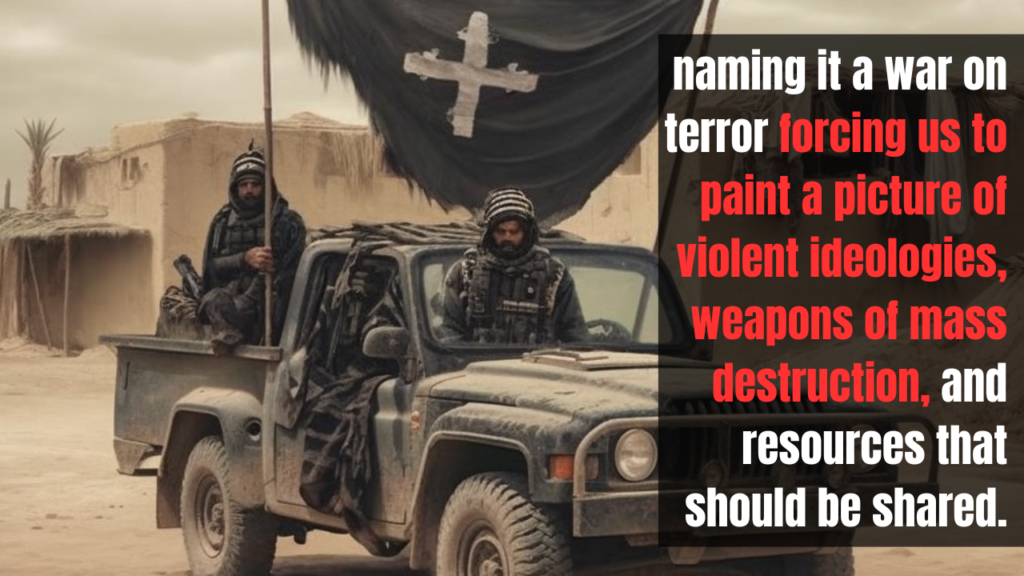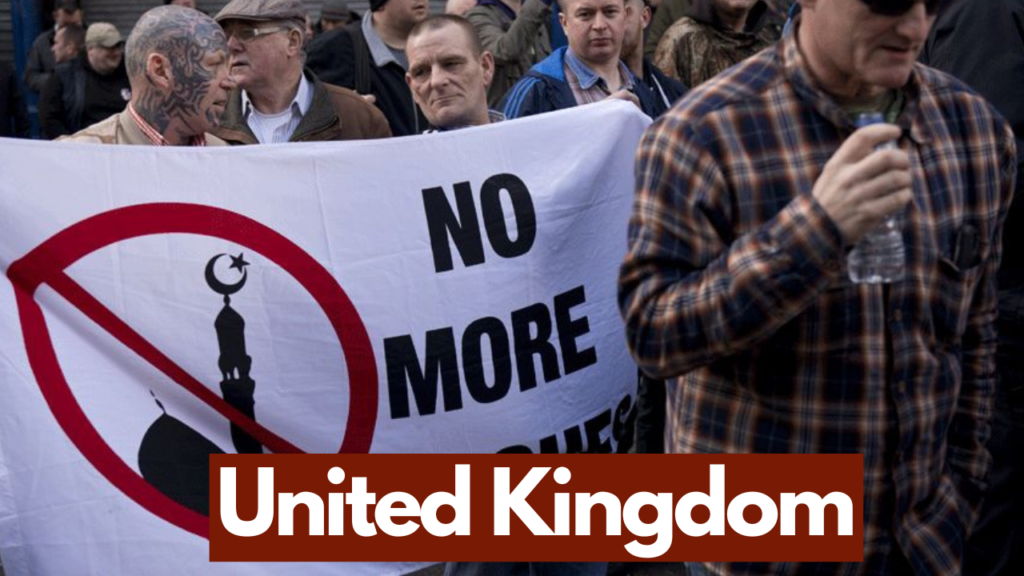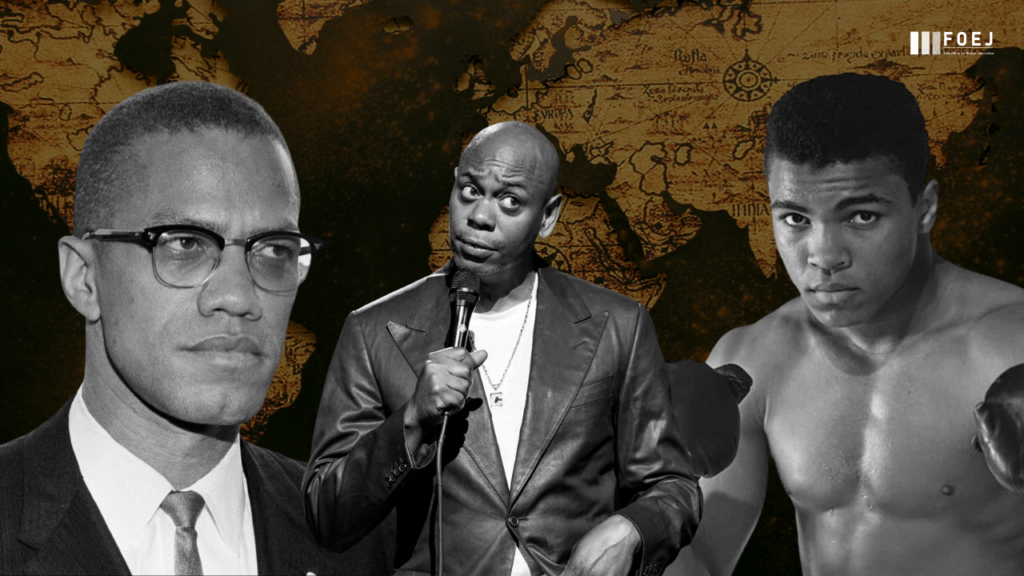Modern Islamophobia is not that far from xenophobia and is a victim of False Propaganda. Most of which became prevalent after the 2001 attack on the World Trade Center. contrary to the early beliefs that made America jump into a war against the Middle East, naming it a war on terror forcing us to paint a picture of violent ideologies, weapons of mass destruction, and resources that should be shared.

Countries, where Islamophobia is most prevalent today, include France, India, the United States of America, China, The United Kingdom, Germany, Sweden, etc. It is almost impossible to deny the existence of blatant racism against Muslims, which is often justified by Islamic terrorism and Freedom of Speech.
But in the last few decades, this term has been contagious around the globe. Numerous incidents have been recorded where holy places of Muslims, have been targeted. Most of them were either demolished or people praying there were haunted by police brutality sponsored by the state or civilian aggressions birthed due to barrage of propaganda and misinformation.
There are a number of Islamophobic incidents that have only seen an increase in frequency and intensity, this article brings together a selection of cases categorized by national territories.
India

Islamophobia has been on the rise in the nation in recent years. This is due to a number of factors, including the rise of Hindu nationalism, the spread of misinformation about Islam, and the government’s discriminatory policies against Muslims
While the Babri Masjid demolition incident may be one of the most significant turning points in the history of contemporary India, it is perhaps less well-known that the Babri Masjid is not the first mosque that has been destroyed in India, nor was it the last to happen.
Although there may have been widespread mosque destruction at the time of the partition, the mosques discussed below only represent the most notable examples of mosques that were destroyed during the post-Babri era, Jharsa Mosque, Gurgaon District, Haryana Malik Asin Mosque, Ahmedabad, Gujarat, Khaja Mosque in Vijayawada, Andhra Pradesh
In Hyderabad, Telangana, there is a mosque called Ek Khana.
The highlights of the event were as if broadcast from the future, as the public protested in Haryana to stop Friday prayers in 37 areas of Gurgaon, of which prayers in 8 locations were canceled.
16 Mosques alone, were destroyed by mobs during anti-Muslim violence In Northeast Delhi, as stated by Delhi Minorities Commission,
Only recently, in the Bihar Sharif violence, two mosques and an 18th century Madarssa (madrasa Azizia ) were attacked, and the two century old library was burned to a crisp along with any Muslim shops.
France

France has closed a mosque in the northern city of Beauvais after authorities said it had been used to preach hatred and violence.
The mosque, which is located in a working-class suburb of Beauvais, was closed for six months on Tuesday. The closure order came after an investigation by the local prefecture, which found that the mosque’s imam had been giving sermons that were “hateful” and “inciting violence”.
The imam, who has not been named, was also accused of promoting “separatism” and of encouraging Muslims to live apart from French society.
The closure of the mosque has been welcomed by some local residents, who said that the imam’s sermons had been causing division in the community.
However, others have criticized the closure, saying that it is an attack on freedom of religion.
The closure of the mosque is the latest in a series of measures taken by the French government to crack down on what it sees as extremism.
In recent years, France has passed a number of laws that have restricted the wearing of religious symbols in public, banned the teaching of some Islamic classes, and made it more difficult for foreign-funded mosques to operate, yet nothing has backfired like the ban on hijab amongst the French Muslim population.
The government’s crackdown on extremism has been criticized by some human rights groups, who say that it is discriminatory and that it is targeting Muslims unfairly.
The government, despite this, has defended its actions by asserting that they are required to “defend France against terrorism”.
The closure of the mosque in Beauvais is a reminder of the tensions that exist between France’s Muslim community and wider society. It is also a reminder of the challenges that France faces in trying to balance its commitment to secularism with its respect for religious freedom.
China

in May 2023, Chinese authorities demolished a mosque in the town of Nagu, in Yunnan province. The mosque, which was built in the 14th century, was one of the oldest in the region. The demolition sparked protests from the local Muslim community, which accused the government of discrimination.
The Chinese government has said that the demolition was necessary to “improve the appearance of the town” and that the mosque was built without proper permits. However, the local Muslim community has said that the demolition was a deliberate attempt to suppress their religion.
The mosque in Nagu’s destruction serves as a reminder of the Chinese government’s escalating intolerance of Islam. It also reflects the mounting worldwide pressure on China to stop its persecution of Muslims.

The demolition of the mosque is part of a broader crackdown on Islam in China. In recent years, the Chinese government has detained hundreds of thousands of Uyghur Muslims in internment camps, where they are subjected to forced labor, brainwashing, and torture. The government has also destroyed mosques and other Islamic cultural sites.
AccordingAccording to an Australian Strategic Policy Institute (ASPI) report based on satellite imagery documenting hundreds of sacred sites and statistical modeling, the province has destroyed nearly 16,000 mosques. The majority of the destruction of these mosques has taken place in the last three years, during which nearly 8,500 mosques have been destroyed, especially outside the urban centers of Urumqi and Kashgar.
United States of America

Within the USA, there have been numerous Islamophobic activities in recent years, and anti-Muslim sentiments have spiked. There are numerous attacks in different states within the USA; a few of the major attacks are listed below.
Washington
There are 19 anti-mosque activities in Washington, which clearly emphasizes how anti-Islamic sentiments are growing.
A reported assault that resulted from protests at the Islamic Center on November 21, 2017, is one of the most prominent examples of how human ideology is getting anti-Islamic.
According to a press release from CAIR-WA, men have repeatedly stood outside the mosque during Friday prayers wearing ‘Make America Great Again’ hats, blocking traffic, entering the mosque’s grounds, leaning into cars, invading worshippers’ personal space, threatening them with deportation, and shouting anti-Muslim epithets at them as they enter the building.
In the released report, one board member stated that “Members feel unsafe and threatened while coming to worship.” “A genuine sense of fear has been felt as a result,”
In the press release, Chris Williams of Cedar Law stated that there is a distinction between peaceful demonstrations and harassment. “The mosque attendees’ self-control in the face of bullying has been wonderful. Despite the protesters’ obvious desire to disturb the peace, we expect the police and courts to assist in keeping it.
California
39 cases of mosque assaults have been seen in California, and most of the cases are similar to Washington’s, which clearly depicts the image of hatred towards a particular community.
At mosques in the Sacramento region, desecrated pages of the Qur’an have been left.
Authorities have looked into alleged hate crimes that may have occurred over the weekend during Ramadan at two mosques in the Sacramento Valley.
According to Lt. Thomas Waltz, a spokesman for the Davis Police Department, the first incident was recorded on Friday night outside the Islamic Center of Davis, where a passing motorist hurled hundreds of pieces of paper bearing verses from the Koran. He claimed that it appeared as though someone had photocopied passages from the Qur’an.
According to the Sacramento Valley Chapter of the Council on American Islamic Relations, the center participated in Taraweeh prayers during the final days of Ramadan.
According to Sgt. Tony Turnbull, a spokesman for the Sacramento County Sheriff’s Department, a charred Koran loaded with bacon was discovered outside the Masjid Annur Islamic Center in the 6900 block of 65th Street the following day in south Sacramento.
Turnbull claimed in a statement that the Qur’an was hung from a fence by a handcuff between a sheriff’s office and the mosque. The Quran is the holy book of Islam, and this incident gives us an example of how easily Islamophobia is conquering society.
These two states were mere examples of how contagious Islamophobia is and how easily it’s spreading around the globe.
According to ACLU data, there have been more than 360 attacks in the last decade in the USA, which has been increasing with time.
New Zealand

On March 15, 2019, a gunman opened fire at two mosques in Christchurch, New Zealand, killing 51 people and injuring 40 others. The gunman live-streamed the attack on Facebook, and his manifesto was filled with racist and anti-Muslim rhetoric.
The shootings were the deadliest mass shooting in New Zealand’s history, and they have had a profound impact on the country.
The government has vowed to crack down on extremism, and the Muslim community has been traumatized by the attack.
Key figures of the event: 51 people were killed and 40 were injured. The gunman was a 28-year-old Australian man named Brenton Tarrant, he was arrested and charged with murder. The shootings were live-streamed on Facebook. Tarrant’s manifesto was filled with racist and anti-Muslim rhetoric.
The Christchurch mosque shootings were a horrific act of violence that has had a devastating impact on New Zealand
Canada
On January 29, 2017, a gunman opened fire at a mosque in Quebec City, Canada, killing six people and injuring 19 others. The gunman, Alexandre Bissonnette, was a 27-year-old French Canadian who was motivated by far-right ideology. He live-streamed the attack on Facebook and published a manifesto that outlined his racist and anti-Muslim views.
The Quebec City mosque shooting was the deadliest act of terrorism in Canada since the 1985 Air India bombing. It was also the first time that a mosque had been targeted in a terrorist attack in Canada. The shooting shocked and saddened Canadians across the country, and it led to
The mosque shooting had a significant effect on the Canadian Muslim community. In the wake of the incident, many Muslims felt uneasy and insecure. For fear of future bloodshed, some mosques shut their doors. But despite the tragedy, the Muslim community also exhibited outstanding fortitude.
To demonstrate their solidarity, they participated in protests and rallies and tried to restore their local communities. increasing calls for action against Islamophobia.
Norway

The Al-Noor Islamic Center shooting occurred on August 10, 2019, in Baerum, Norway, about 20 kilometers (12 mi) west of the capital city of Oslo. Philip Manshaus, a 21-year-old Norwegian man, shot and killed his adopted stepsister at their home. He then drove to the mosque and shot his way through the glass door before opening fire, hitting no one.
He was subdued by three worshippers after a scuffle and turned over to the police. He was convicted of murder and committing an act of terrorism, and sentenced to 21 years of preventative detention.
Before going to the mosque, Manshaus killed his younger stepsister while she was in her bed, firing three bullets into her head and one into her chest. He was wearing a uniform and helmet when he entered the mosque, shooting his way through the locked door. Manshaus attempted to live stream the shooting on Facebook using a GoPro camera attached to his helmet but failed. He was carrying two rifles and a shotgun, stolen from his father’s gun cabinet. He opened fire in the mosque, hitting no one. Prayers had just ended, with only three elders remaining in the mosque.
The three elders, Mohammad Rafiq, Mohammed Usman, and Shoaib Raza, subdued Manshaus after a scuffle. They were able to disarm him and detain him until the police arrived. Manshaus was arrested and charged with murder and terrorism.
The shooting at the Al-Noor Islamic Center served as a stark warning about the perils of extremism and anti-Muslim sentiment.
Germany

According to Brandeilig, a project of the rights organization FAIR International, more than 800 mosques in Germany have been the victims of threats and attacks since 2014. However, in the majority of these incidents, the crimes were not thoroughly investigated.
Between 2014 and 2022, the group—which established Germany’s first reporting center for mosque attacks—recorded roughly 840 incidents of attacks, vandalism, and threats.
According to thorough research, the majority of the incidents in 2018 went unsolved, which encouraged left-wing extremists or neo-Nazis to carry out additional attacks against Muslim places of worship.
In Gelsenkirchen Mosque Attack of 2020 Unknown individuals threw Molotov cocktails at a mosque, causing a fire. And it is quite frequent for the anti Muslim organization PEGIDA to demand the shutting of mosques, which has always demanded a “Muslims free state”
Only nine of the 120 attacks on mosques that were reported in 2018 had perpetrators that could be identified.
Several attacks on mosques were carried out by left-wing extremists and members of the YPG/PKK terror group, however, the bulk were carried out by right-wing extremists or neo-Nazi organizations, according to the research.
The second-largest Muslim population in Western Europe is found in Germany, a nation of more than 83 million people. Nearly 5.3 million Muslims live in the nation, and 3 million of them are Turkish.
South Korea

Pig heads were found placed outside a mosque in South Korea on Monday, in an act that has been condemned as “pure Islamophobia”.
The heads were found at the Dar-ul-Emaan Kyungpook and Islamic Center in the city of Daegu. The mosque is used by Muslim students from Kyungpook National University.
According to Mian Muaz Razaq, a spokesman for Muslim students at the institution, the first one was placed there on October 27, followed by another on November 14, and a third on December 6. Every day, students who visit the location to pray pass through the lane.
The Muslim community in South Korea is small, but it has been growing in recent years. The country has a population of about 52 million people, of which about 50,000 are Muslims.
Islamophobia is a growing problem in South Korea. In recent years, there have been a number of incidents of violence and discrimination against Muslims.
The incident at the mosque is a reminder of the dangers of Islamophobia. It is important to remember that all people, regardless of their religion, deserve to be treated with respect and dignity.
Spain

A mosque in the Spanish city of Murcia was vandalized on Saturday, June 17, 2023. The latest in a series of attacks on Muslims in the country
The mosque, located in the town of Cabezo de Torres, was spray-painted with the words “no to Islam” and “stop the invasion.” Vandals also left a pig’s head with a knife in it outside of the mosque.
The attack comes just weeks after a Moroccan man was shot and killed in Murcia. The man, Younes Bilal, was shot while sitting at a cafe with friends.
The attacks have sparked outrage in Spain, with Muslim leaders and politicians calling for an end to the violence. The Spanish government has condemned the attacks and vowed to bring the perpetrators to justice.
Ethiopia

The demolition of several mosques in Ethiopia has sparked protests from the Muslim community. The demolitions, which began in May 2023, have been carried out by the government of the Oromia region, which is home to the majority of Ethiopia’s Muslims.
The government has said that demolitions are necessary to remove illegal buildings. However, the Muslim community has accused the government of targeting mosques and discriminating against Muslims.
The protests have been met with a heavy-handed response from the government. Security forces have used tear gas and live ammunition to disperse the protesters, and there have been reports of arrests and injuries.
The demolition of mosques is a sensitive issue in Ethiopia, where Muslims and Christians make up about 40% and 60% of the population, respectively. There have been tensions between the two communities in the past, and the demolitions have only served to heighten those tensions.
The demolitions have also been condemned by the Ethiopian Human Rights Commission (EHRC). The EHRC said that the demolitions were “illegal and unconstitutional” and that they “violated the rights of Muslims.”
The protests and the government’s response have raised concerns about the future of religious freedom in Ethiopia. The demolitions have shown that the government is willing to use force to suppress dissent, and they have created a climate of fear among the Muslim community.
It is unclear how the situation will be resolved. The government has shown no signs of backing down, and the Muslim community is unlikely to give up without a fight. The demolitions have created a deep rift in Ethiopian society, and it is possible that the country could be headed for a period of instability.
Poland

No mosques in Europe will be built until Saudi Arabia permits a church to be built nearby, according to a Polish minister.
In an interview on live television with Mahdi Hassan on Al Jazeerah, a Polish member of parliament, Dominik Tarczynski, declared his support for the ban on burqas. According to him, the relationship between the Islamic world and the West is currently out of balance, so Poland shouldn’t permit the construction of another mosque until the European nation can build a cathedral in Saudi Arabia.
As stated by Tarczynski, Islamic face coverings “should be outlawed in the same way that the Christian cross is outlawed in Saudi Arabia.”
He cited a proposal from Saudi Arabia to build a mosque in Warsaw as an example and said, “We’re happy to have it once they agree for Poland to build a cathedral in Saudi Arabia.”
The Polish minister stated, “It’s really straightforward; either we are equal, we are partners, we are the same human beings, or they feel they are superior to others.
The internet’s dissemination of tropes and memes such as “We’ll accept Muslims/mosques here when they allow Bibles/churches in Saudi Arabia” is a result of dissatisfaction with this scenario.
The influential Catholic Church in Poland has been silent on the matter, although the priesthood is split between ecumenical cooperation and xenophobic conservatism.
A PBS DGA telephone survey of 500 Poles on March 25 found that 48 percent of respondents were against the building of a mosque with a minaret in their neighborhood, while 42 percent had no opinion.
“This fear results from ignorance. Assimilation of Muslims is successful in some nations, such as Austria and Norway, according to Agata Skoworn-Nalborczyk, an expert in Islam at Warsaw University.
But after all the instances of building mosques in Poland, it is a fact that One of the earliest church buildings ever, known as Jubail Church, is located in Saudi Arabia; it was built around the 4th century.
Australia

There is a lot of violence committed against mosques in Australia. In order to determine the scope of anti-Muslim violence following the 2019 attack in Christchurch, New Zealand, researchers canvassed mosques throughout Australia.
The horrific mass killings that occurred in New Zealand on March 15, 2019, had a close connection to Australia.
The Australian attacker had long been committed to extreme right-wing Islamophobia, according to the New Zealand royal inquiry investigating the attacks, and had brought this ideology with him to New Zealand. In actuality, Muslim groups in New Zealand have long reported threats and violence, as well as unexplained activity at one of the mosques attacked in Christchurch.
Mosques in Australia after the Christchurch attack to determine the scope of anti-Muslim violence there. Without knowing the Australian background that at least partially nurtured the Christchurch atrocity, we cannot fathom it.
The fact that more than half (58.2%) of participating mosques or those who attended them faced targeted violence between 2014 and 2019 is particularly alarming.
In situations that received media attention, the risk of an assault rose. For instance, victimization rates were higher for 100% of mosques that were featured in the media and for 83% of mosques that encountered online opposition to their construction.
Arson, physical attacks, graffiti, vandalism, verbal abuse, online abuse, and hate mail, including death threats, were among the forms of violence experienced by mosque goers and mosque structures.
These acts of violence showed observable geographic variations. Despite having more mosques, Sydney had proportionally fewer attacks between 2014 and 2018 (41% of 51 mosques) than Melbourne (70% of 17 mosques) and Brisbane (89% of 9 mosques). In 2019, following the shooting in Christchurch, 29% of attacks in Australian states and territories targeted mosques.
Once more, these attacks were unequally distributed around the states, with a greater number of attacks targeted at mosques in Brisbane and Melbourne.
United Kingdom

According to a May, 2020 report by Al Jazeerah, “About 42 percent of mosques or Islamic institutions in a newly released UK report have experienced religiously motivated attacks in the last three years.”
Nearly two-thirds of the 113 mosques that participated in the survey reported that the attacks harmed the wider community, with 9 percent reporting that their mosques or Islamic institutions

Ironically, During World War II, most of the European nations had a good relationship with the Ottoman Empire, and had Alliances with Muslim nations such as Morocco, which controlled the entrance to the Mediterranean and served as a gateway to western Africa.
Even as late as the 1990s, Islam was upheld by names like Muhammad Ali, Malcom X, Hamza Yusuf, and Dave Chapelle, who painted a great image of the religion in the United States. Why, then, One may ask, did the very Muslims become strangers and foreigners out of nowhere, in a span of just three decades.

In the last 10 year, one can estimate the number of attacks on mosques to be as high as 18,000. Some were raked to dust on the ground, while others were painted with messages of hatred in spray paint.
There were attacks that were downright Horrific, like the one in New Zealand’s Christchurch mosque, that Forced the west to acknowledge the existence of Islamophobia, of which they had been in denial for the past two decades.
It is evident from the research above that Islamophobia is real and is either Ignored by the state or sponsored by it. China has carried out mass demolitions with no consequences or sanctions from the West or Middle East. It is also a reflection of the breakdown of the world over Islam and is evidence of how the rest of the world is one planet and the Islamic world is another.
In a country like Germany, where Anti-Jewish sentiments were once rampant, there is a rebirth of Similar sentiments, except this time, for the Muslim population. PEGIDA, an Anti-Muslim organization, has been openly calling for a ban for the past 10 years on Muslim migrants , Adhaan, and mosques where Muslims gather to pray.
The mainstream media can continue to turn a blind eye to these incidents but the truth shall always find a way.
Researched by FOEJ team
written by Mantasha Asfar and Shariq Adeel Yusuf



